Introduction
Artificial Intelligence (AI) has emerged as a transformative force in DevOps, revolutionizing the software development and operations landscape. With its ability to automate tasks, analyze data, and provide predictive insights, AI is reshaping traditional processes and driving innovation. In this article, we will explore the challenges faced by DevOps teams and how AI addresses them.
We will delve into the key benefits of AI in DevOps, including greater automation and efficiency. Additionally, we will discuss how AI is automating DevOps processes, enhancing continuous integration and deployment (CI/CD), and enabling proactive problem-solving through predictive analytics. Furthermore, we will examine how AI optimizes resource allocation, integrates with ChatOps and AI assistants, and enhances monitoring and incident management.
We will also explore the challenges and best practices for implementing AI in DevOps and discuss the future of AI-driven DevOps. As the digital landscape continues to evolve, AI is proving to be an indispensable tool in navigating the complexities of DevOps and staying competitive in a rapidly changing world.
Challenges in DevOps and How AI Addresses Them
In the midst of the expanding digital environment, DevOps teams are responsible for maneuvering through intricate infrastructures, voluminous information, and the imperative of seamless continuous integration and deployment. This multifaceted challenge has been met with the advent of Artificial Intelligence (AI), which brings to the table a suite of capabilities to revamp traditional processes. AI is skilled at automating repetitive tasks, thoroughly analyzing information to uncover patterns and detect anomalies, and equipping teams with predictive insights, catalyzing proactive measures rather than reactive firefighting.
AI's prowess is not confined to automation alone. It extends to enhancing the observability of systems through advanced telemetry data analysis, encompassing Metrics, Events, Logs, and Traces (MELT). This enhanced observability is crucial in a world where programs stacks are progressively composed of microservices, container orchestration, hybrid clouds, and messaging queues. Such detailed insights are essential for engineers and site reliability engineers (SREs) who struggle with the fragile nature of complex software systems. With AI, the goal isn't merely to store and query data but to fundamentally improve debugging efficiency and ease.
The transformative impact of AI in DevOps is echoed in the continuous integration and delivery (CI/CD) processes. AI enables the development, testing, and deployment of code, ensuring that only thoroughly tested changes are integrated and deployed, thus reducing risks and strengthening code quality. This integration not only yields better software but also fosters a more collaborative environment among operations, business teams, and other areas. Critical thinking, teamwork, and independent thinking become indispensable in this AI-driven setting.
Real-world scenarios demonstrate that AI can be seamlessly integrated into business processes without overhauling existing infrastructures. Initiating this integration with historical data analysis, organizations can establish a foundational understanding, subsequently incorporating streaming data to discern real-time patterns. This process, powered by machine learning, unfolds the potential for automation and predictive analytics.
The recent Docker State of Application Development survey reveals that developers are keenly adopting tools that streamline their workflow and energize their creative problem-solving capabilities. The survey, which involved more than 1,300 developers, emphasized the movement towards AI integration, emphasizing its importance across different business functions and especially in marketing, sales, and product innovation.
Essentially, AI is not merely an addition to the toolkit; it is a transformative power that is reshaping the paradigm of creating programs, propelling innovation, and compelling companies to remain competitive in a world driven by AI.
Key Benefits of AI in DevOps
The implementation of Artificial Intelligence (AI) in DevOps is reshaping the domain of development and operations by facilitating increased automation and efficiency. By integrating AI-driven analytics, teams can leverage real-time insights for quicker decision-making, ensuring that problem-solving is both fast and accurate. This not only accelerates the deployment process but also elevates the quality of software products.
One compelling example is Aviva, a leading insurance company that embraced machine learning to automate over 70 use cases, previously burdened by manual deployment processes. This shift in strategy allowed Aviva to redirect their scientists' efforts from operational tasks to innovation, significantly optimizing their resource allocation.
Moreover, AI's role in predictive analytics and monitoring is crucial for maintaining system performance and operational efficiency. Companies like GitLab are enhancing their suites with AI capabilities, such as GitLab Duo Chat, which offers real-time code analysis and troubleshooting assistance. This level of support is pivotal for IT teams, who require immediate access to testing and production environments for their business data.
Statistics reveal a growing trend among developers, with a Docker State of Application survey showing that a substantial number of respondents from small to large companies are actively using tools that aid in application creation. This includes AI-driven tools that automate code generation and bug detection, making the process more efficient and reducing the likelihood of errors.
The benefits of AI in DevOps extend beyond technical improvements. According to Jeremy Rambarran from Touro University Graduate School of Technology, AI enhances critical thinking, teamwork, and design skills within IT teams, thereby reinforcing their existing growth and deployment strategies. Moreover, the incorporation of AI in CI/CD procedures provides enhanced program quality and promotes collaboration among operations, and business teams.
In summary, the incorporation of AI into software development and operations is not only a fad but also a strategic decision towards increased innovation, efficiency, and collaboration, as demonstrated by the achievements and numerical evidence from industry frontrunners and developer communities.
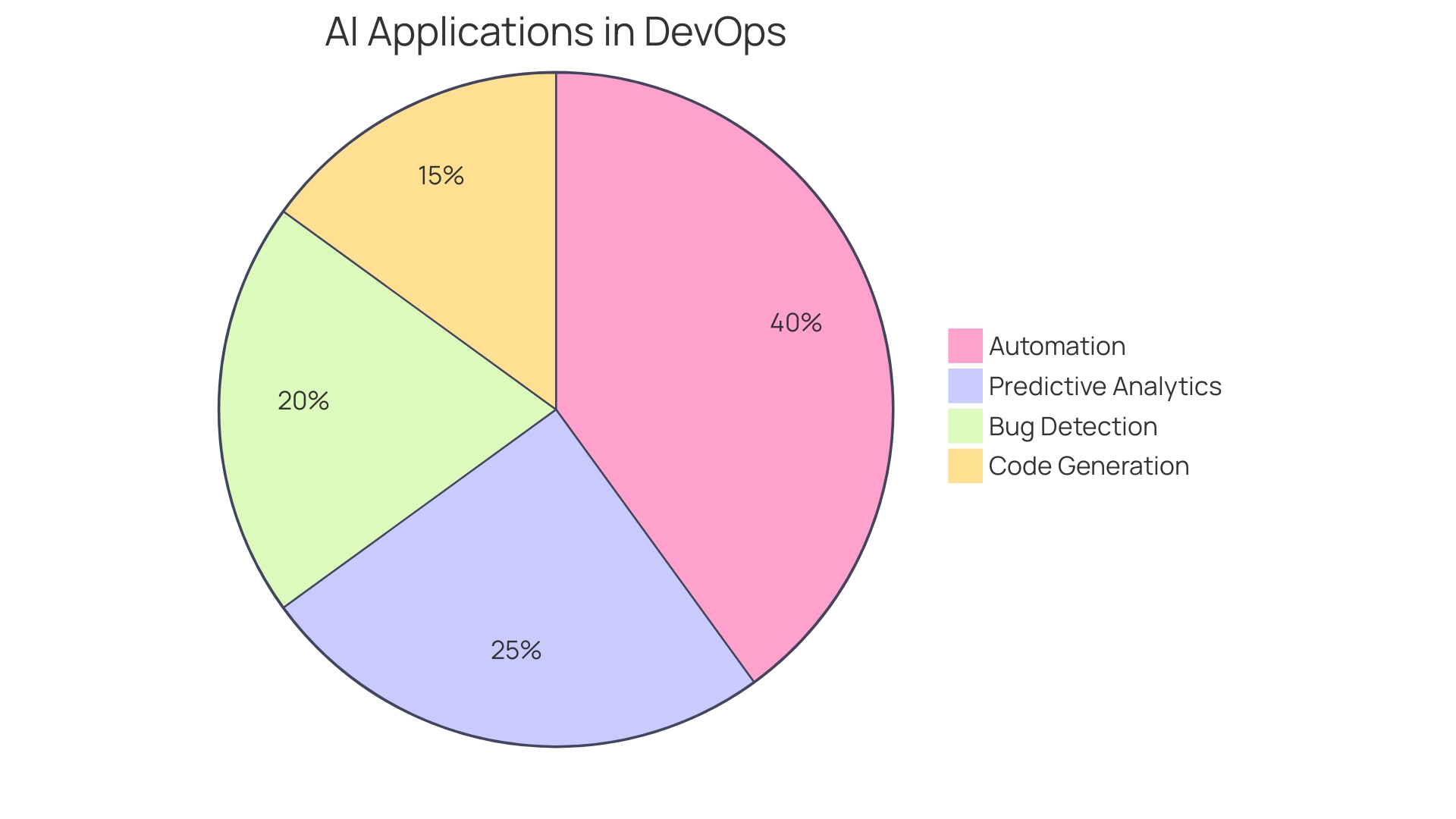
Automating DevOps Processes with AI
The incorporation of artificial intelligence (AI) in the field has been a game-changer, particularly in the realm of automation. With Ai's capacity for automating complex workflows, tasks that were once tedious and time-consuming, such as code testing, deployment, and system monitoring, are now streamlined. This has not only accelerated the pace at which deployments can be made but also enhanced the reliability of these processes. The result is an overall boost in productivity and a marked decrease in system downtime.
AI-driven automation in software development and operations relies on breaking down complex business processes into smaller, manageable segments to automate them, ranging from the simple task of sending automated alerts to engineers when issues arise, to complex workflows that necessitate coordination across different systems and applications. The overarching goal is to enable DevOps and IT teams to channel their efforts towards strategic, high-value activities, thus embracing a 'work smarter, not harder' philosophy.
This strategic shift is underscored by the adoption of continuous integration and continuous delivery (CI/CD) practices, which GitLab's analysis highlights as areas where AI excels. By automating the build, test, and deployment stages, AI ensures that changes meeting the test criteria are seamlessly merged and deployed, minimizing the likelihood of errors and strengthening program quality.
In the broader scope of program creation, such mechanization tools have also helped to reduce the divides that historically existed between different teams—coding, operations, quality control, and other corporate divisions. The historical emergence of the combination of philosophies and practices in the late 2000s has brought forth a significant shift towards continuous improvement in the creation and delivery of software, with AI now playing a pivotal role in this ecosystem.
The advantages of AI in the field of process optimization go beyond; they promote a more collaborative environment by bringing together teams involved in development, operations, and business. As Jeremy Rambarran from Touro University Graduate School of Technology points out, AI strengthens existing methodologies and demands a range of skills like critical thinking, teamwork, design, and visual information display.
Furthermore, companies that incorporate AI into their operational practices are selecting between complete automation and enhancement strategies. Some are exploring the full automation and replacement of certain developer roles with autonomous agents, while others, like Pieces, focus on augmenting developers' capabilities, providing tools to enhance efficiency and effectiveness.
The potential of AI to enhance human creativity is immense, and its application in software development and operations is a testament to its capabilities. As AI continues to evolve, it presents opportunities for developers to transcend traditional boundaries, backed by an ever-expanding suite of tools that augment their roles in an increasingly complex tech environment. The evidence of Ai's impact is evident, with studies such as Turing's revealing a 25% average increase in developer productivity, highlighting AI's influence on project delivery and product innovation cycles.
In summary, Ai's role in automating software development processes has established a new paradigm for productivity and collaboration, ensuring that software development is not only faster and more efficient but also more interconnected and innovative.
Predictive Analytics for Proactive Problem-Solving
Artificial Intelligence (AI) has emerged as a transformative force in software development, with predictive analytics offering a compelling example of its integration. By harnessing past information and trends, AI empowers teams specializing in development and operations with the ability to anticipate and proactively address potential system issues. This capability is especially vital in high-stakes environments like telecommunications, where service continuity is paramount. Advanced AI models, previously constrained by the extensive resources needed to train them, now take advantage of advancements like few-shot learning, enabling swift adjustment to new tasks with minimal information.
The practical applications are abundant, as demonstrated by AI tools in quality assurance. For instance, the latest AI-driven visual inspection technologies can detect minuscule defects in materials at a pace and precision unattainable by human inspectors. This not only enhances quality but does so cost-effectively.
Such technological strides are not confined to the manufacturing sector. A case in point is Auchan Ukraine's AI model, adeptly forecasting demand across various food products in their hypermarkets, a system later adopted by Auchan in Romania and France. The model highlights Ai's ability to provide precise, extensive predictive insights, a valuable resource for ensuring efficient resource allocation and reducing downtime.
Moreover, AIOps platforms harness the power of AI to handle vast data volumes, shifting IT operations from a reactive to a proactive stance. This proactive approach is essential for maintaining system reliability and avoiding issues before they escalate, aligning with the ethos of continuous improvement. As AI continues to infiltrate different business functions, its role in propelling innovation and customer engagement becomes more and more apparent, with generative AI experiencing the highest adoption in marketing, sales, and product enhancement.
Despite the potential of AI to improve software development practices, it is essential to address concerns regarding reliability and security. Initiatives like Science4Cast demonstrate the continuous efforts to utilize AI for future research predictions, further solidifying Ai's role in shaping the trajectory of technological advancements. Still, with the rapid proliferation of AI in DevOps, it is crucial to maintain 'humans in the loop,' ensuring that the control center remains with people, even as AI acts as a catalyst for business acceleration.
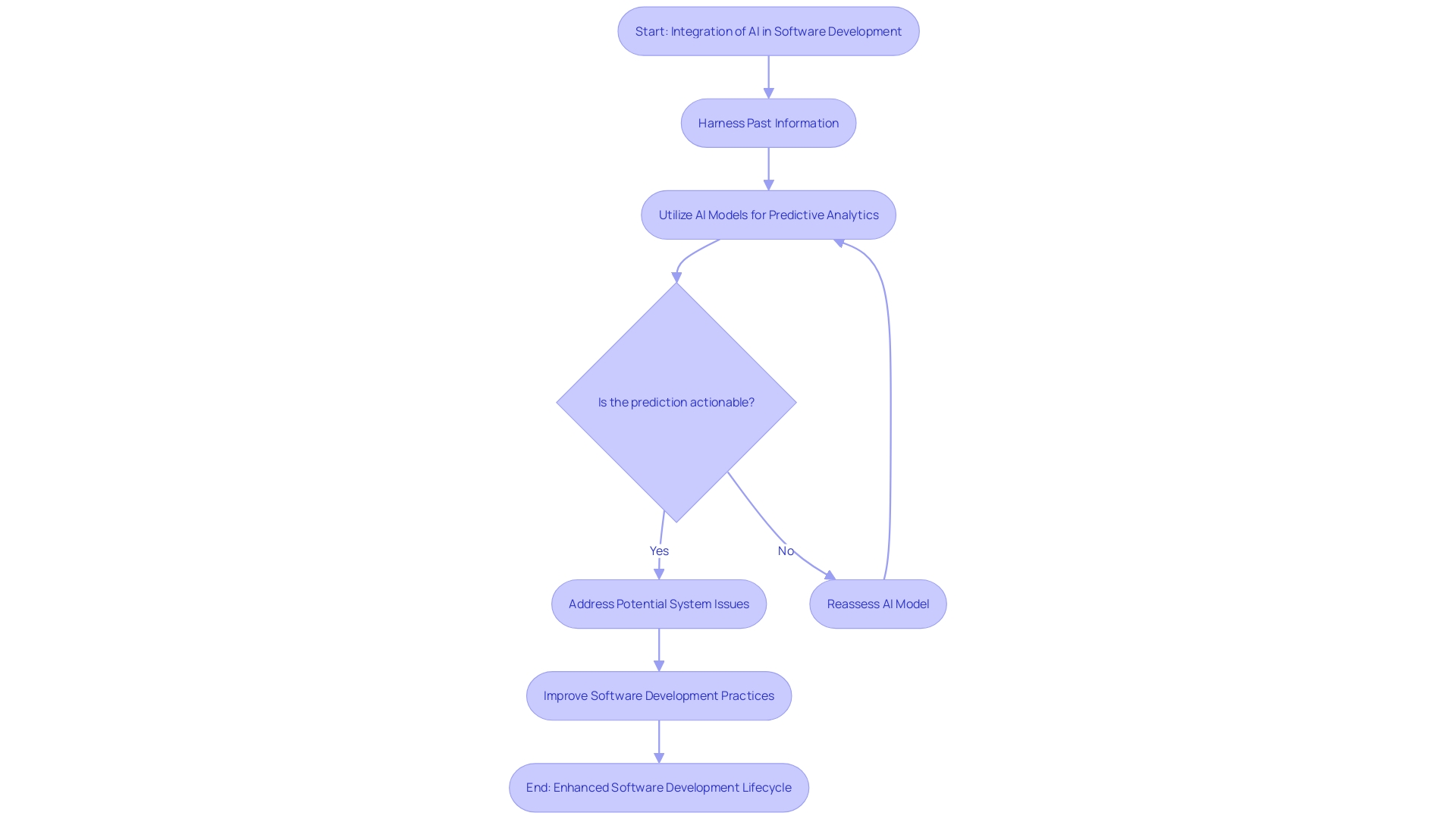
Enhancing Continuous Integration and Continuous Deployment (CI/CD) with AI
The incorporation of Artificial Intelligence (AI) is revolutionizing the domain of application development, especially in the areas of continuous integration and continuous deployment (CI/CD). By leveraging Ai's capabilities to automate comprehensive testing, scrutinize code quality, and refine deployment strategies, organizations are witnessing a significant enhancement in their CI/CD pipelines. The influence of AI in these processes not only expedites the delivery of software but also elevates the quality of the final product, thereby empowering businesses to adapt more swiftly to the evolving demands of their customers.
Throughout the field, remarkable instances have surfaced where AI's influence on software development and operations is evident. For instance, the BMW Group has been at the forefront of incorporating AI into their engineering and data science workflows, with Machine Learning Engineer Amor Steinberg leading the charge in developing Jupyter Managed, a code-centric analytics and machine learning workbench. Steinberg's expertise, shaped by his DevOps background in the finance sector, underlines the critical balance between technological innovation, regulatory compliance, and customer security. Similarly, Marinus Krommenhoek, a Senior Cloud Solution Architect at BMW, championship the modernization of IT services through cutting-edge, maintainable solutions that align with agile methodologies and microservices architecture.
The value of open-source contributions to the advancement of computer science is another testament to AI's role in enhancing collaborative ecosystems. By openly sharing tools, products, and datasets, as observed in initiatives by major players like Google, the broader research community benefits from a wealth of resources that fuel further innovation and progress.
AI does more than just automate mundane tasks; it introduces a paradigm shift in how developers approach problem-solving and system design. As eloquently stated by industry experts, while AI can streamline repetitive work, the creative and intricate nature of writing code remains a uniquely human domain. From conceptualizing architecture to understanding user requirements, developers wield a blend of technical acumen and empathy that AI cannot replicate. Nevertheless, as AI continues to evolve, it promises to augment the developer's toolkit, enabling them to focus on high-value activities by offloading routine tasks.
The industry of creating computer programs, including approximately 27 million individuals who write code globally and valued at around $700 billion, is on the verge of a revolution with AI-driven tools. These tools not only support developers in ancillary tasks like source control and unit testing but are also beginning to aid in more substantial aspects of coding. This evolution signifies a shift where developers can concentrate more on crafting code, thus fueling innovation and efficiency within the software development lifecycle.
AI-Powered Monitoring and Incident Management
The incorporation of Artificial Intelligence (AI) in software development and operations has resulted in notable progress in monitoring and incident management. AI algorithms are now capable of sifting through vast datasets at unprecedented speeds, identifying patterns that would be impossible for humans to detect in real-time. These tools not only flag anomalies but also predict potential disruptions before they escalate into critical incidents. This predictive capability is a game-changer, allowing DevOps teams to transition from reactive to proactive responses. Consequently, this reduces the mean time to resolution (MTTR), minimizes downtime, and maintains system performance at optimal levels.
According to a recent study showcased in a paper titled 'AI-Driven Guided Response for Security Operation Centers with Microsoft Copilot for Security,' the application of AI in security response can greatly enhance operational efficiency. Moreover, the implementation of service-oriented architectures underscores the significance of AI in handling progressively intricate systems, particularly in regards to microservices and cloud-based applications. The imperative to deploy software with minimal bugs aligns with Ai's predictive analysis capabilities, which can foresee and mitigate potential issues in real-time.
However, the reliability of AI remains a topic of discussion. As AI continues to evolve, it is crucial to maintain a balance between automation and human oversight, ensuring that AI serves as an accelerator rather than a replacement for human expertise. In line with this, a Docker State of Application survey involving over 1,300 developers emphasized the increasing significance of AI in application creation, with generative AI experiencing notable adoption in marketing, sales, and product innovation.
Furthermore, AI-powered startups are emerging as major contributors, providing innovative solutions to intricate issues. With the right tooling and controls, AI can significantly enhance business operations and software development processes. Ensuring that technology augments human capabilities and drives businesses forward requires keeping humans in the loop, harnessing the full potential of AI and guaranteeing that the collaboration between humans and technology is maximized.
Resource Optimization through AI
Artificial Intelligence (AI) is increasingly becoming an indispensable tool in DevOps, particularly in streamlining and automating resource allocation. By leveraging AI to analyze patterns of resource usage, it can pinpoint inefficiencies and recommend enhancements to the current setup. For example, products today are designed to operate in diverse environments and on various platforms. Azure, for example, must consistently deliver high performance across an array of server configurations, hardware models, and operating systems. Given the constraint of resources and the complexity of modern delivery, it is critical to utilize AI-driven optimization algorithms. Such algorithms aim to find near-optimal solutions that balance resource use with time constraints.
The transformative power of AI in infrastructure management, workflow optimization, and expediting deployment. This is particularly relevant when considering the meticulous planning that precedes the execution of AI models in production. Data scientists and infrastructure engineers collaborate to create and implement these models, ensuring they are trained adequately to handle real-world tasks effectively. Ai's role in resource allocation is pivotal during this phase, as it involves managing compute resources for model training and deployment, which are often Stateful Workloads.
By automating resource allocation, organizations can achieve more efficient infrastructure utilization, cost reductions, and enhancements in scalability and performance. As we navigate through the complexities of AI and optimization, it becomes evident that the incorporation of artificial intelligence into software development and delivery practices is not only an enhancement but a groundbreaking leap in how we approach the creation and distribution of software. According to a specialist in the field, AI applications are streamlining intricate assignments, lessening day-to-day workloads, and addressing shortcomings that have impeded numerous organizations from fully realizing the complete potential of development and operations.
The dedication to maximizing and prioritizing resource utilization, exemplified by the use of Kubernetes, demonstrates the industry's commitment to optimizing AI compute resources. This commitment is further illustrated by the creation of specialized libraries to tackle complex optimization problems, applicable across various domains. As AI continues to advance and merge with the field of operations, the commitment of improved automation and predictive analytics is poised to reshape the landscape of coding.
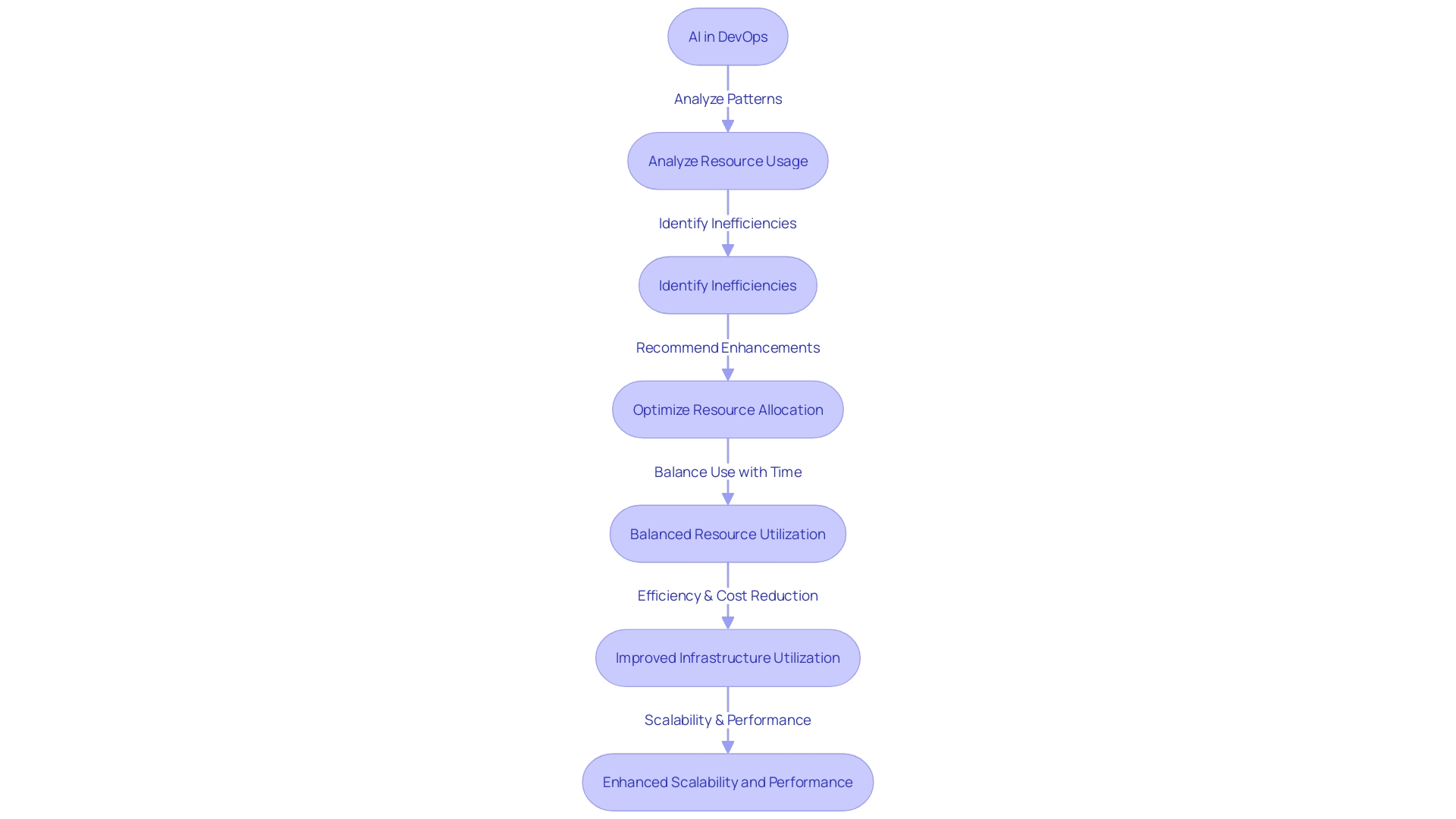
Integrating AI with ChatOps and AI Assistants
AI-powered chatbots and virtual assistants are revolutionizing the way DevOps teams collaborate and manage their workflows. By automating routine tasks such as incident management, release coordination, and knowledge dissemination, these intelligent tools are significantly enhancing efficiency. For instance, Holiday Extras, a leading travel extras provider, faced the challenge of serving an international user base, which necessitated marketing materials and customer support in multiple languages. The integration of AI in their operations allowed them to scale effectively, despite the various languages and technical skill levels across their team.
Similarly, a large tools manufacturing business harnessed the capabilities of AI to optimize customer service operations, enabling their CX teams to concentrate on delivering superior experiences. This move was driven by the need to build AI systems capable of managing scale, ensuring accuracy, and providing consistent outputs in production environments.
In the hospitality sector, Leonardo Hotels implemented an AI solution to centralize and automate communication, thereby improving efficiency and guest satisfaction. This is a testament to how AI can be leveraged to streamline operations and enhance the customer experience across various industries.
A research conducted by GitLab uncovers that AI plays a crucial role in streamlining CI/CD procedures, resulting in reduced mistakes and enhanced software quality. Moreover, AI is fostering closer collaboration between development, operations, and business teams by providing access to critical environments and data.
The significant influence of AI on application development is further demonstrated by the latest Docker State of Application Development survey, with developers recognizing the significance of AI in their work. These insights highlight the mutually beneficial relationship between AI and the collaborative culture of continuous improvement in the fast-paced world of technology.
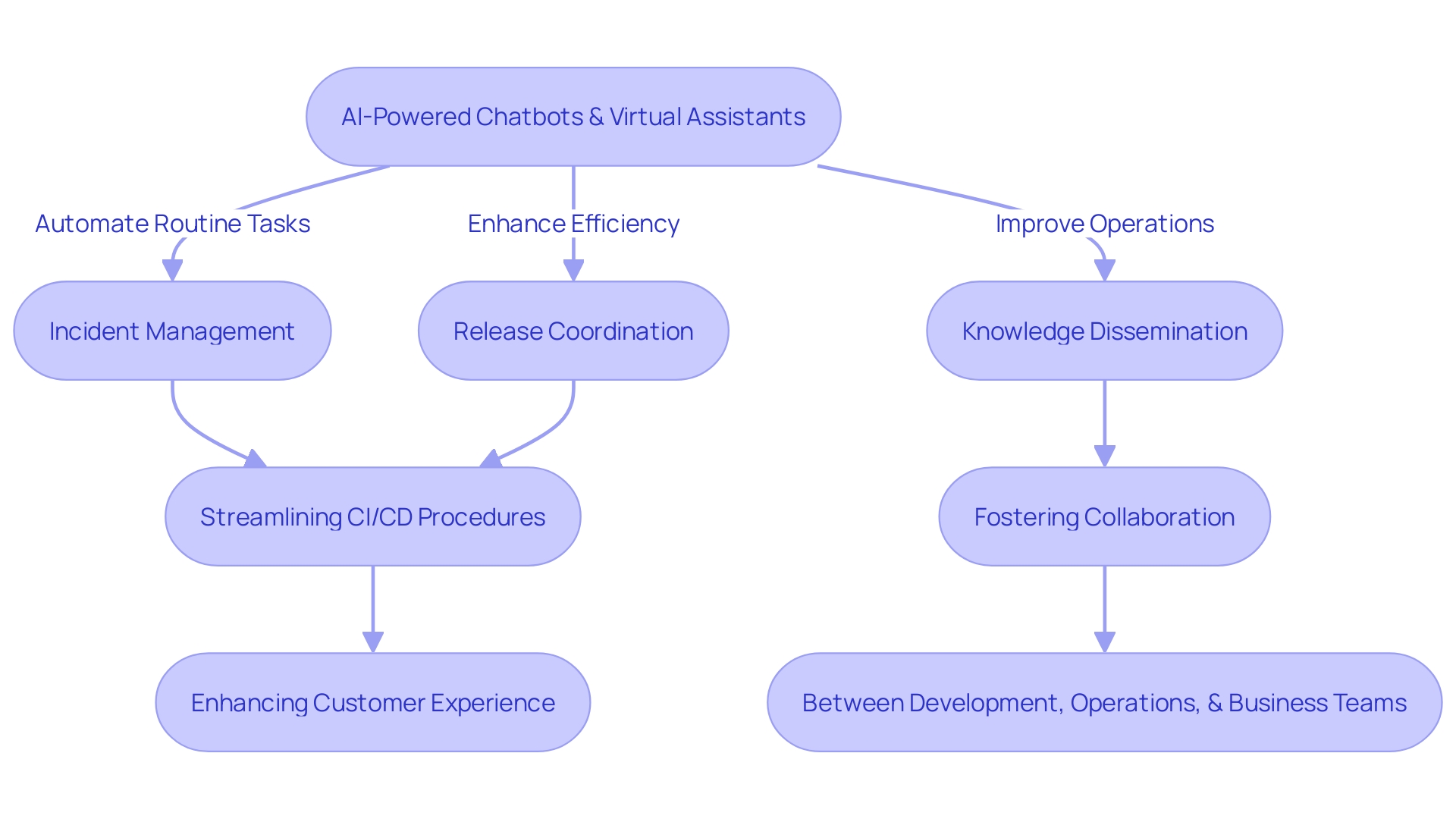
Overcoming Challenges in AI-Driven DevOps
The emergence of Artificial Intelligence (AI) in the field is reshaping the landscape by automating intricate tasks and decreasing manual workload. Ai's capabilities extend from problem-solving to learning and reasoning, akin to human intelligence. This transformative power is particularly evident in continuous integration and continuous delivery (CI/CD) processes, where AI is filling gaps and elevating the quality of software pipelines. However, integrating AI into DevOps is not without its challenges.
Organizations are struggling with issues such as information quality and its availability, which are crucial for training effective AI models. To leverage Ai's complete potential, information must be both abundant and pertinent. Methods such as information augmentation and creation of simulated information are being used to alleviate the scarcity and improve the significance of accessible datasets. Moreover, cross-organization collaboration and data-sharing initiatives have become essential for overcoming data limitations.
Transparency and explainability of AI algorithms also remain a concern. As AI systems become more complex, understanding their decision-making process is crucial for accountability and ethics in AI. This is where industry best practices, like DORA metrics, come into play. DORA metrics, covering lead time for changes, deployment frequency, and mean time to restore, provide a framework for assessing and enhancing the performance of software creation pipelines.
Furthermore, the integration of AI into software development practices is promoting a cultural change within organizations. It encourages critical thinking, teamwork, visual information display, and independent thinking. Professor Jeremy Rambarran from Touro University Graduate School of Technology emphasizes that AI is not just about better software—it's about bringing together development, operations, and business teams.
Lastly, there is the hurdle of cultural resistance to change. The incorporation of AI in the integration process necessitates a cultural shift towards cooperation and ongoing education. Companies have to navigate the complexities of implementing AI tools while retaining the human touch in engineering, as direct customer engagement remains vital for delivering products that truly resonate with users.
In summary, the future of AI in software development operations is promising, with the technology ready to automate and enhance software delivery. But success hinges on overcoming challenges related to information, transparency, and culture. Through the implementation of strong information management, prioritizing AI ethics, and cultivating a cooperative atmosphere, companies can effectively utilize the benefits of artificial intelligence in their operational practices.
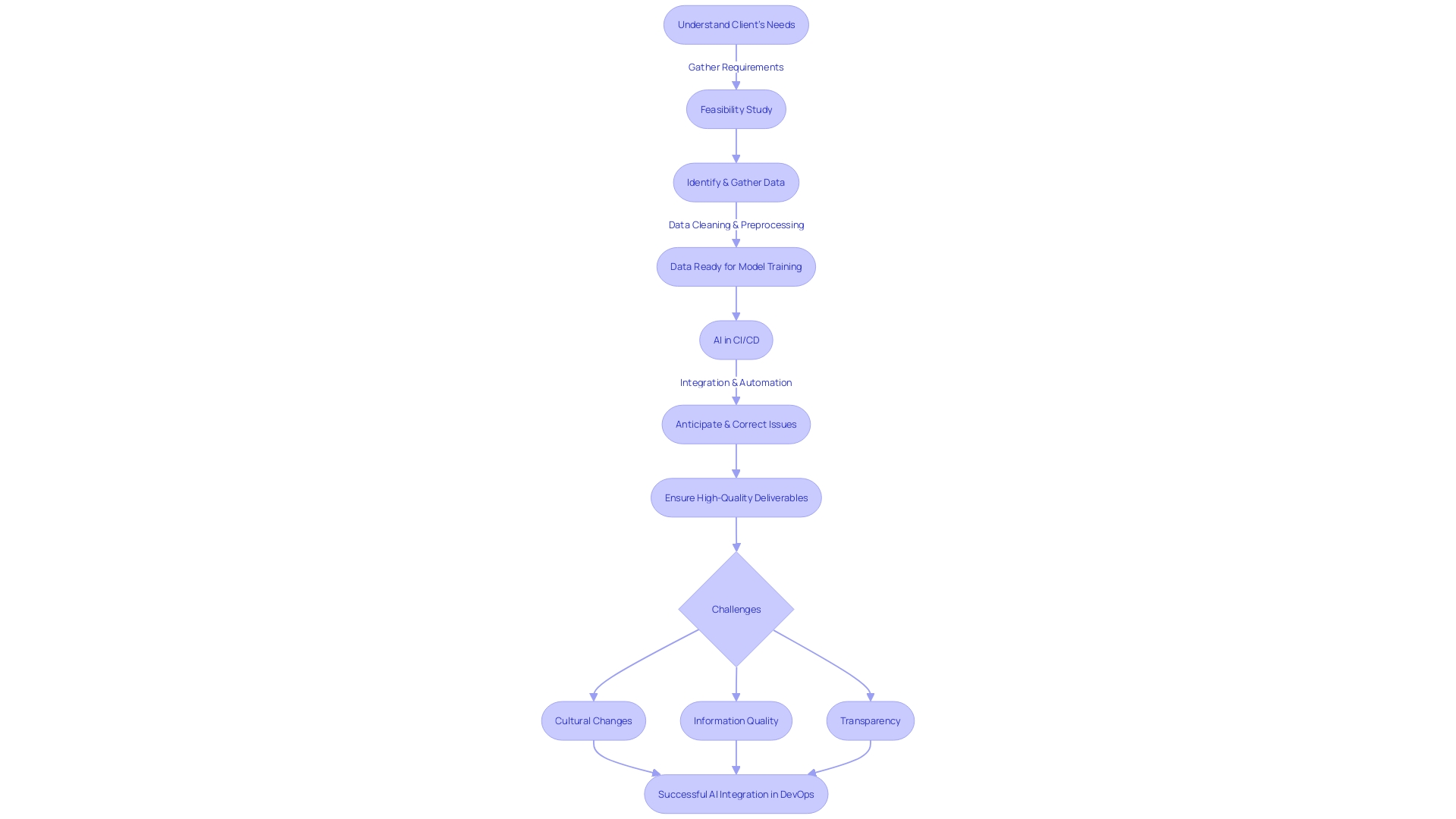
Best Practices for Implementing AI in DevOps
Creating a strong AI-enabled environment depends on strategic implementation and embracing a culture of innovation, as demonstrated by industry leaders. Aviva, a premier insurance firm, utilizes machine learning across over 70 use cases, transitioning from manual deployment to emphasizing operational efficiency, which previously consumed more than half of their data scientists' time. This shift underscores the need for a systematic approach, emphasizing the importance of well-defined objectives and fostering an environment conducive to continuous improvement and creativity.
The integration of Artificial Intelligence (AI) into the practice of program engineering is transforming the landscape of application development and delivery. By streamlining complex tasks and predicting potential issues in the delivery pipeline, AI is filling critical gaps and elevating the quality and reliability of software products. This advancement in software development practices, incorporating monitoring and predictive analytics, is a testament to the crucial role of AI in propelling innovation and guaranteeing customer satisfaction. As reported in the latest Docker State of Application Development survey, with over 1,300 developers participating, there's a clear emphasis on leveraging cutting-edge tools and processes to enhance productivity and foster community engagement within the tech industry.
Furthermore, the strategic implementation of AI in business functions has been a driving force for innovation and customer interaction, with generative AI playing a significant role in marketing, sales, and product improvement. The emergence of machine learning operations (MLOps) and platforms like Kubeflow Pipelines further demonstrate the trend, combining DevOps principles with the creation of AI applications. This combination of philosophies and practices allows organizations to deploy machine learning models with agility and precision, ensuring consistency and collaboration between scientists and engineers.
To remain competitive in an AI-driven world, organizations must prioritize the revision of software development governance and emphasize the importance of continuous learning and adaptation in AI technologies. This requires a strategic and cultural shift, as well as a commitment to training, as highlighted by the Global DevSecOps Report, where 81% of respondents expressed a desire for more education on effective AI utilization. In the end, the effective integration of artificial intelligence into development and operations depends on a distinct vision, a dedication to information accuracy, scalable AI infrastructure, and a culture that appreciates experimentation and continuous learning.
Future of AI-Driven DevOps
The incorporation of Artificial Intelligence (AI) into software development and operations is not only a concept of the future but a tangible, evolving reality. Companies like Aviva, a stalwart in the insurance industry with a vast customer base, are already capitalizing on the power of machine learning. Aviva, with its extensive use of ML across over 70 scenarios, exemplifies the transition from manual, UI-driven model deployment to more automated, AI-empowered processes. This shift is crucial as it addresses a core challenge in the tech sector—freeing data scientists from the time-consuming operational tasks that previously occupied over half their time, thus fostering an environment ripe for innovation.
The AI-driven DevOps not only minimizes the likelihood of errors but also significantly enhances the quality of software. It brings together growth, operations, and business teams, facilitating a collaborative and efficient work ecosystem. This is evident from the analysis by GitLab, which highlights Ai's role in automating CI/CD processes, thereby allowing quick integration of changes into production. Moreover, AI is reshaping the developer experience, offering a set of tools that turns a routine configuration task into a chance for innovative solution creation.
As the global development industry, valued at approximately $700 billion and supported by an estimated 27 million developers, continues to grow, the adoption of AI in is recognized as a game-changer. The industry's reliance on AI is not just about automating routine tasks; it is also about enhancing the developer's capacity to write code beyond the traditional ten lines per day, as noted in Fred Brooks' seminal book, "The Mythical Man-Month."
Therefore, the future of artificial intelligence in development and operations appears promising, with the capability to transform infrastructure management, workflow enhancement, and delivery speed improvement. It is a critical enabler for organizations aiming to thrive in the digital age by delivering software more rapidly, improving quality, and refining customer experiences. The path to innovation and competitive advantage in this era is through embracing AI-driven DevOps, as evidenced by the transformative experiences of leading companies like Aviva.
Conclusion
In conclusion, the integration of AI into DevOps is revolutionizing software development and operations. AI automates tasks, analyzes data, and provides predictive insights, leading to greater efficiency and optimization of resources. It enhances continuous integration and deployment processes, fostering collaboration among teams.
AI's predictive analytics capabilities improve monitoring and incident management, reducing downtime and resolving issues faster.
While implementing AI in DevOps presents challenges, such as data quality and transparency, organizations can overcome them by adopting best practices. Clear objectives, a culture of innovation, and investment in data governance and AI ethics are crucial.
The future of AI-driven DevOps looks promising. Companies are already benefiting from AI's integration, and the industry recognizes its potential. AI will revolutionize infrastructure management, workflow optimization, and software delivery acceleration.
Embracing AI-driven DevOps is the key to innovation and gaining a competitive advantage in the digital age.




